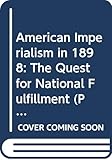American imperialism in 1898; the quest for national fulfillment. Edited by Richard H. Miller.
Material type: TextSeries: Problems in American historyPublication details: New York, Wiley [1970]Description: xii, 206 p. maps. 22 cmISBN:
TextSeries: Problems in American historyPublication details: New York, Wiley [1970]Description: xii, 206 p. maps. 22 cmISBN: - 0471605107
- E713 .M63
| Item type | Current library | Call number | Copy number | Status | Date due | Barcode | |
|---|---|---|---|---|---|---|---|
 Books (30-Day Checkout)
Books (30-Day Checkout)
|
Nash Library General Stacks | E713.M63 | 1 | Available | 33710000393095 |
Includes bibliographical references.
WAR, NEWBERY,
Introduction: The white man's burden, by R. Kipling.-Part 1: The rationales for American overseas expansion: It was au courant mainifest destiny, by J.W. Pratt. Imperialism was the antithesis of manifest destiny, by F. Merk. America was engulfed by a psychic crisis, by R. Hofstadter. Economic motives were the decisive factors, by W.A. Williams.-Part 2: The decision for war against Spain: Cleveland's view of the Cuban crisis, 7 December 1896, by G. Cleveland. McKinley's view of the Cuban crisis, 6 December 1897, by W. McKinley. The business community was reluctant, by J.W. Pratt. The business community was the most influential lobby for war, by W. LaFeber. The President asks for war, 11 April 1898, by W. McKinley.-Part 3: The decision to take Hawaii and the Philippines: Without the war Hawaii might never have been ours, by T.A. Bailey. McKinley got what he wanted, by H.W. Morgan. Instructions to the Peace Commissioners, by W. McKinley. The Philippines were insular stepping stones to the Chinese pot of gold, by T.J. McCormick. The Filipino point of view, by T.A. Agoncillo.-Part 4: The protest against imperialism: The anti-imperialists: too few too feeble, by F.H. Harrington. Bryan was caught in a trap, by P.E. Coletta. The 1900 election was a mandate for partisanship, not imperialism, by T.A. Bailey.-Part 5: Epilogue: American and European imperialism compared, by R.W. Winks.
